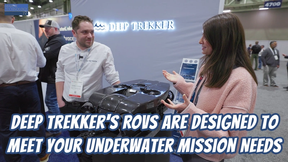Offshore Personnel and Students Receive Simulator-based Lifeboat Training
The Fisheries and Marine Institute of Memorial University (MI) of St. John’s, Newfoundland is the first post-secondary institution in the world to offer simulation-based training in launching, maneuvering and recovering lifeboats in all weather conditions. MI’s Offshore Safety and Survival Centre is training offshore personnel and students on the Survival Quest system developed by Virtual Marine Technology (VMT), also of St. John's. VMT develops simulators for survival craft and high-speed electronic navigation training.
“Using the SurvivalQuest simulator we can better prepare lifeboat operators to handle a variety of emergency launch conditions in a safe, realistic and focused learning environment,” said Glenn Blackwood, Executive Director of the Marine Institute.
Learning how to perform an emergency evacuation on the water, even in moderately rough conditions, can result in injury or death, as occurred in the sinking of the Ocean Ranger drilling rig offshore Newfoundland in 1982 and the Piper Alpha disaster in the North Sea in 1988. “Lifeboat simulation bridges the gap between classroom theory and on-the-water experience,” said VMT President and CEO Captain Anthony Patterson. “Using simulation, students are able to develop skills which cannot be developed in the classroom and are logistically too difficult to practice on-the-water.”
Seated in the SurvivalQuest cabin, the trainee looks out at several computer screens which display the computer-generated weather and sea state, as well as the lifeboat’s pitch and roll.
The development of SurvivalQuest began in 2002, when a joint research project was undertaken by the National Research Council’s Institute for Ocean Technology (NRC-IOT) and Memorial University’s Faculty of Engineering and Applied Science and the Marine Institute. Their focus was to develop an innovative survival craft launching simulator for lifeboat coxswain and fast rescue craft pilots to undergo evacuation training in extreme conditions, but in a safe environment.
Model scale experiments were conducted in NRC-IOT’s towing tank, ice tank, and offshore engineering basin, and full-scale trials were conducted at the Marine Institute’s Offshore Safety and Survival Centre. NRC-IOT researcher Antonio Simoes Re’s operational data and modeling techniques collected during the model and full-scale trials were incorporated into the development of the virtual training system. “The NRC Institute for Ocean Technology supported each step of the technology development process,” said Dr. F. Mary Williams, Director General of NRC-IOT, “and, as a result has been recognized with the federal government’s Excellence in Technology Transfer Award for 2010.”
Memorial University’s School of Human Kinetics and Recreation advised VMT to ensure the realism of the simulated lifeboat environment.
Funding for SurvivalQuest was provided by the Atlantic Canada Opportunities Agency, the Government of Newfoundland and Labrador’s Department of Innovation, Trade and Rural Development, Petroleum Research Atlantic Canada, the National Research Council, and private and venture capital.








 December 2025
December 2025



